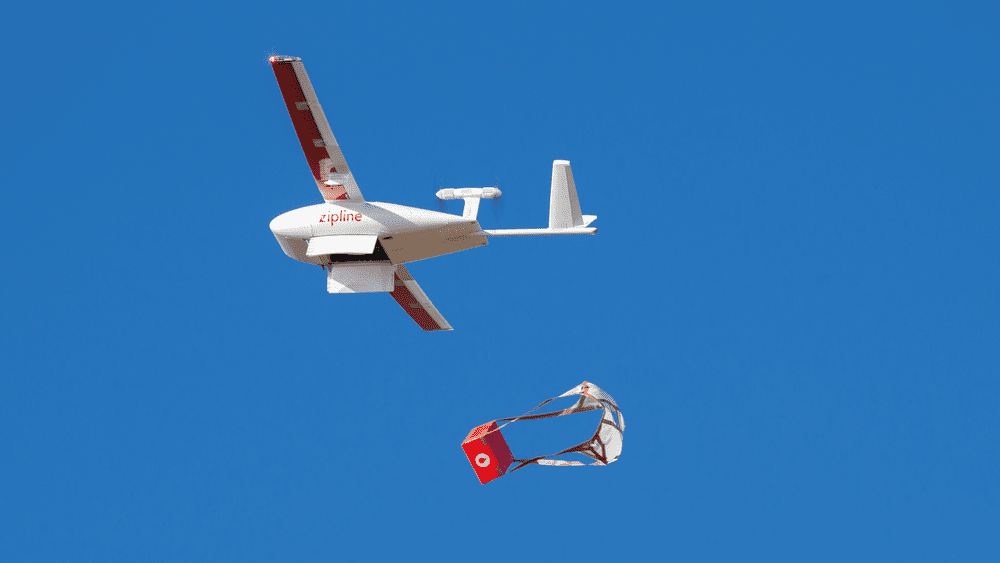
A new partnership between Zipline and MultiCare Health System aims to launch drone delivery services for transporting medical supplies in 2024. (Photo: Zipline)
Autonomous electric drone developer Zipline recently announced a partnership with MultiCare Health System for launching the first commercial drone delivery operations in the state of Washington. MultiCare, a not-for-profit healthcare organization, will be able to use Zipline’s drones for delivering medical supplies throughout MultiCare’s network of hospitals, offices, and laboratories. The services will start in the Tacoma area before expanding elsewhere in the state.
Zipline expects to begin drone deliveries in 2024 following regulatory approvals. In partnership with MultiCare, Zipline will continue drone delivery operations for a duration of two years.
In June, Zipline was awarded its Part 135 Air Carrier Certificate from the Federal Aviation Administration. This authorizes the company “to complete the longest range on-demand drone deliveries in the U.S.,” Conor French, Zipline’s General Counsel, shared with Avionics International in an emailed statement. The initial certification allows for operations in North Carolina, and French explains that their team will work closely with the FAA in order to continue growing operations and enabling drone deliveries in other regions.
The engineering team at Zipline consistently designs, prototypes, and tests new technologies. One of their recent developments is a detect-and avoid system that uses acoustic-based technology to equip their drones “with 360-degree awareness over a range of 2,000 meters, allowing us to navigate the airspace safely and effectively,” according to French.
The solution utilizes an array of microphones that are situated on the wing of the aircraft. These microphones can differentiate between sound profiles and communicate that information for the aircraft to then determine the best course of action.
“We found that all the other technology solutions were too expensive because they were over-engineered, too infrastructure-heavy, or not precise enough to meet the regulatory requirements we were seeing, based on conversations we were having with regulators,” explained Okeoma Moronu, Head of Aviation Regulatory and Legal Affairs at Zipline, in a recent interview with Avionics.
Zipline has launched deliveries in Kannapolis, North Carolina, where the company has a distribution center. Two healthcare organizations, Magellan Rx Management and Novant Health, are able to use Zipline’s services for delivery of specialty medications directly to patients’ homes. These drone deliveries are “helping reduce barriers to care for patients and increase medication adherence,” French stated.

A Zipline distribution center located in North Carolina (Photo: Zipline)
Another major healthcare organization in North Carolina that uses Zipline’s delivery services is Cardinal Health. They are able to use the drones to quickly deliver products to pharmacies as needed, resulting in fewer scenarios where a patient’s medication is out of stock.
Conor French shared that the company has signed a partnership agreement with Intermountain Healthcare for delivery of specialty pharmaceuticals to patient homes. “Ultimately, our goal is to serve 90% of people in the Salt Lake City metro area, and we expect to begin deliveries later this year,” he explained.
Zipline operates at a national scale in Ghana and Rwanda. They perform deliveries to thousands of health facilities and can transport hundreds of different medical products. “We also recently began deliveries in Nigeria, and will soon begin delivering in Kenya and Côte d’Ivoire,” according to French.

Pictured above is a doctor in Rwanda, where Zipline performs drone deliveries to transport medical supplies to health facilities across the country.
The drones developed by Zipline have a range of 100 miles and can fly efficiently in all types of weather. French noted that one distribution center can provide services throughout a region with an area of 7,800 square miles or more—”roughly one-and-a-half times the size of Connecticut.”
Zipline’s ability to scale up by adding distribution centers has enabled the company’s operational success across Rwanda and Ghana.
The drone developer’s operations have also launched in Asia. As of last year, the Toyota Tsusho Corporation uses the delivery drone system for the on-demand distribution of medical supplies for health facilities in Japan’s Gotō Islands. Toyota Tsusho made investments into Zipline in 2018, and the companies also partnered for deliveries of medical products in Ghana.